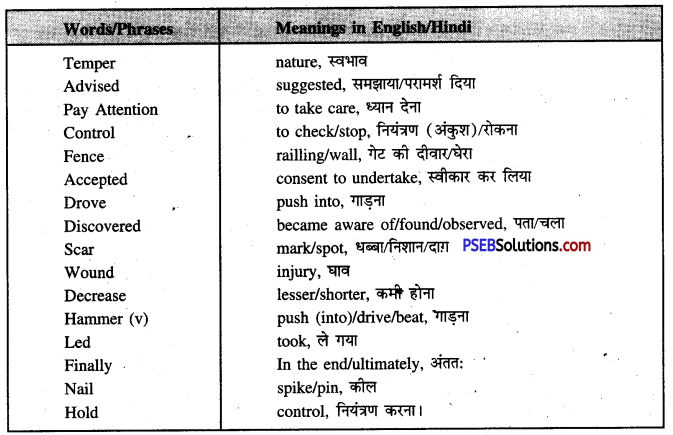Punjab State Board PSEB 7th Class English Book Solutions Chapter 7 A Hole in the Fence Textbook Exercise Questions and Answers.
Class 7th English Solutions Chapter 7 A Hole in the Fence Question Answers
A Hole in the Fence Class 7 Questions and Answers
Activity 1.
Look up the following words/phrases in a dictionary. You should seek the following information about the words and put them in your WORDS notebook.
1. Meaning of the word as used in the story (adjective/noun/verb, etc.)
2. Pronunciation (The teacher may refer to the dictionary or the mobile phone for correct pronunciation.)
3. Spellings
| fence | advised | control | hammer | accept |
| decrease | discover | temper | scar | wound |
Vocabulary Expansion
Activity 2
Solve the crossword puzzle given below. Read the hints (meanings) for the words given under ‘Across’ and ‘Down’. The words are from the story.

Answer:

Across →
5. able to manage
6. find something new
8. to take something
9. barrier
10. a mark on the skin
Down ↓
1. hit something hard
2. a tear in the skin
3. become lesser or smaller
4. guiding someone
5. a state of being angry or calm
![]()
Activity 3.
Answer the following questions as briefly as you can.
Question 1.
Why did the boy have no friends ?
लड़के के दोस्त क्यों नहीं थे ?
Answer:
The boy had no friends because he always used a bad language in a fit of anger.
Question 2.
Why were his parents worried ?
उसके माता-पिता क्यों चिंतित थे ?
Answer:
His parents were worried because he had a bad temper.
Question 3.
Whạt task did his father give him to do ?
उसके पिता ने उसे कौन-सा कार्य करने को दिया ?
Answer:
His father gave him a bag of nails and hammer and said, “Every time you lose your temper you must hammer a nail into the back of the fence.
Question 4.
How did it help the boy ?
इसने लड़के की मदद कैसे की ?
Answer:
By hammering nails, he discovered that it was easier to control the anger than to drove nails.
Question 5.
What did his father tell him after he had taken out all the nails ?
जब लड़के ने सभी कील निकाल दिए तो पिता ने उस बच्चे को क्या बताया ?
Answer:
The father told him that a wound given with the words is as bad as the one given with a knife.
Question 6.
What is the moral of the story?
कहानी से क्या शिक्षा मिलती है ?
Answer:
We should be polite to others and use kind words.
Activity 4.
Write ‘True’ or ‘False’ in the space given against each statement.
1. The boy had many friends. — (False)
2. He had a habit of using bad language. — (True)
3. His mother came up with a plan to help him. — (False)
4. The boy hammered nine nails into the fence on his first day — (False)
5. The boy never learned to control his temper — (False)
![]()
Activity 5
Select the correct option and fill it in the given blank.
Question 1.
The little boy was …………………. by other boys.
(a) popular
(b) liked
(c) disliked.
Answer:
(c) disliked.
Question 2.
The boy had no friends because ………….
(a) he used bad language
(b) he bullied other boys
(c) he would hit small boys.
Answer:
(a) he used bad language
Question 3.
His father thought of a/an …..
(a) advice to give him
(b) task to give him
(c) reason for his behaviour.
Answer:
(a) advice to give him
Question 4.
The father asked the boy to … whenever he felt angry.
(a) count from 1-10
(b) drive a nail into the fence
(c) pull out a nail from the fence.
Answer:
(b) drive a nail into the fence
Question 5.
The father was able to …. ….. him a lesson about good behaviour.
(a) show
(b) teach
(c) make.
Answer:
(b) teach.
Learning Language
Sentence and its Types
Read the following sentences or groups of words.
1. Amit is a good actor.
2. Where are you going?
3. Seema works very hard.
4. What a beautiful day!
5. Chandigarh is the capital of Punjab.
Please note that all these sentences:
1. begin with capital letters
2. end with a full stop (.), a question mark (?) or an exclamation mark (!)
Notice that these groups of words make complete sense.
Sentence शब्दों का सार्यक समूह होता है।
Now, read the following group of words:
pot flowers The are in
इस शब्द समूह का कोई अर्थ नहीं है।
Now read the same words in another order :
The flowers are in the pot.
यह शब्द समूह पूरा अर्थ देता है | इसलिए यह राक sentence है
![]()
Activity 6.
Rearrange the following groups of words and punctuate to make meaningful sentences
Question 1.
ferocious lions animals are.
Answer:
Lions are ferocious animals.
Question 2.
love grandparents a my me lot.
Answer:
Grandparents love me a lot.
Question 3.
is my best Rajan friend.
Answer:
Rajan is my best friend.
Question 4.
Mercury system in is the hottest the planet solar.
Answer:
Mercury is the hottest planet in the solar system.
Question 5.
is the Ganges sacred a river.
Answer:
The ganges is a sacred river.
Activity 7
Make meaningful sentences by using the following words.
1. building – This is a tall building.
2. chair – The chair is made of wood.
3. dance – She likes to dance.
4. walk – Morning walk is good for health.
5. dictionary – I have an English, Punjabi dictionary.
Types of Sentences.
Sentences are of four types: Declarative, Interrogative, Imperative and Exclamatory.
1. Declarative sentences tell something or make a statement. A full stop (.) is used at the end of such sentence.
2. Interrogative ये वाक्य कोई प्रशन पूछते है | इनके अन्त question mark (?) “INT GIRI
3. Imperative : These sentences are either requests or commands. They tell someone to do something. They also end with a full stop.
4. Exclamatory : These sentences show a feeling and exclamation mark (!) mark is used at the end of such sentence.
Activity 8
Identify the type of sentence and write it in the given space.
1. Will the guests be late ? — Interrogative
2. She scored a century. — Declarative
3. I have completed my work. — Declarative
4. Read this book now. — Imperative
5. The trip was exciting ! — Exclamatory
6. Who went to Delhi ? — Interrogative
7. Shut the door. — Imperative
8. What a cute dog ! — Exclamatory
9. Butter is better than jam. — Declarative
10. Brush your teeth. — Imperative I
Activity 9
Identify each type of sentence and explain your answer.
1. The students went on an educational trip.
Type : Declarative.
Reason : It is a statement.
2. Shall we go to the Thunder Zone Theme Park ?
Type : Interrogative.
Reason : It asks a question.
![]()
3. We must try to be on our best behaviour for the next two months.
Type : Declarative
Reason : It is a statement.
4. The dog ate the biscuit.
Type : Declarative.
Reason : It is a statement.
5. Wow, I have won the lottery !
Type : Exclamatory
Reason : This shows a feeling and uses an exclamation mark at the end.
6. How far away is the park from the school ?
Type : Interrogative
Reason : It asks a question and has a question mark at the end.
7. Let’s go back soon or we will miss the train !.
Type : Exclamatory
Reason : This gives a suggestion and warning.
8. Stop asking questions.
Type : Imperative
Reason : It gives a command.
9. Let’s go to the party!
Type : Exclamatory
Reason : It gives a suggestion.
10. The students wondered why they were going to the amusement park.
Type : Declarative.
Reason : It is a statement.
Learning to Listen
Activity 10
Listen to your teacher’s instructions on how to grow a plant. Try to write as you listen. After 5 minutes, your teacher will speak again. Complete your activity while listening to the process the second time.
You will need
1. seeds of your choice such as pumpkin seeds, sunflower seeds, lima beans or pinto beans
2. good quality soil
3. a container to hold the soil and your seeds
4. water
5. light and heat Now write all the steps with their description in the grid given below.
Description de Take some seeds of pumpkin or sunflower Use good quality soil. Take a container to hold the soil and seeds. Water the soil and the seeds.
Put the container in the open for light and heat. Learning to Speak
Answer:
| Steps | Description |
| 1. | Take some seeds of pumpkin or sunflower |
| 2. | Use good quality soil. |
| 3. | Take a container to hold the soil and seeds. |
| 4. | Water the soil and the seeds. |
| 5. | Put the container in the open for light and heat. |
Activity 11 (Pairwork)
Based on your listening activity and your notes in the grid above, discuss with your partner the process of how a seed becomes a plant. You can also take hints from the diagram given below.

Answer:
1. Fill the container with soil.
2. Plant the seeds in the soil.
3. Keep the container at a warm place. Sunlight is good but try to avoid too much direct sunlight. A window sill is a good spot.
4. Keep the soil moist by watering it every day.
5. Be careful not to use too much water.
6. Record your observations as the seeds germinate and seedlings begin to sprout from the seeds.
![]()
Learning to Write
|
Personal Letters Letters written to one’s parents, relatives and friends are called personal letters. Format of Personal Letters 1. The Heading (your address and date): |
Specimen of a Personal Letter
Write a letter to your friend inviting him to attend the wedding party of your elder brother.

Activity 12.
Imagine that you are Neeraj. Write a letter to your cousin telling him/her how you helped a friend used to overcome his habit of using bad language. You may share with your friend the idea you used to stop him from using bad language.
Answer:
105 The Mall,
Amritsar,
June, 20, 2020.
Dear Navjot,
I received your letter yesterday. I want to tell you about a friend of mine who had a bad temper. He used bad words even in his routine talks. This bad habit earned him a bad name. No one liked to talk to him. So I hit upon a plan to reform him. Whenever he used a bad word, I objected to it and made him to say ‘sorry’. Gradually, he got tired of his sorries. He began to control his speech. Within a week, he was speaking a kindly and softly. It was a great change which made both of us happy and surprised.
Your loving brother
Neeraj
Learning to Use Language
Activity 13
Look at the picture given below. In the given space, describe what is happening in the picture.

Water-Cycle
The picture shows the water-cycle in nature. Water in oceans, ponds, rivers and other water evaporates due to heat. The vapour gets mixed with the air. The air becomes light and goes up. Clouds are formed.
![]()
Trees cool down the clouds and the vapour get condensed into water drops, hailstones etc. They being heavy drop down on earth. It is called precipitation. All this is water. It flows down on the ground and get collected in the water bodies again. Hence, the completion of the cycle.
Comprehension Of Passages
Read the following passages carefully and answers the questions that follow each :
(1) Once there was a little boy who lived with his parents in a small village. His parents were worried because he had a bad temper. He had no friends because he always used bad language in a fit of anger. His parents advised him many times to control his anger but he did not pay attention.
The father kept thinking and then he got an idea. The next day, his father gave him a bag of nails and a hammer. He said to him, “Every time you lose your temper, you must hammer a nail into the back of the fence.” The boy accepted the task happily.
1. Why were the boy’s parents worried ?
लड़के के माता-पिता चिंतित क्यों थे ?
2. What task did his father gave him ?
उसके पिता ने उसे क्या काम करने को दिया ?
3. Choose true and false statements and write them in your note book.
(a) The boy refused to do the job.
(b) His boy lived in a small village ?
![]()
4. Complete the sentences according to the meaning of the passage.
(a) He always used bad language in ………..
(b) Her father gave him a ………….. and a hammer.
5. Match the words with their meanings.
| (a) temper | idea |
| (b) accepted | agreed to |
| nature. |
Answer:
1. The boy’s Parents were worried because he had a bad temper.
2. His father asked him to hammer a nail into the back of the fence every time he lost his temper.
3.
(a) False
(b) True.
4.
(a) He always used bad language in a fit of angers.
(b) His father gave him a bag of nails and a hammer.
5.
(a) temper – nature
(b) accepted – agreed to
(2) Every time, the boy felt angry, he ran to the fence and drove a nail into it. The first day, the boy had driven thirty nails into the fence. After a few days, the number of nails started decreasing. Over the next few weeks, he discovered that it was easier to control his anger than to drive those nails into the fence. Finally, the day came when the boy did not lose his temper at all.
He had not hammered any nail into the fence. He told his father about it. The father gave him one more task to do. He asked the boy to pull out one nail for each day that he was able to hold his temper. The days passed and the little boy was finally able to tell his father that all the nails were gone.
1. How many nails did the boy push into the fence the first day?
पहले दिन लड़के ने दीवार में कितने कील गाड़े ?
2. What did the boy discover after a few weeks?
कुछ सप्ताह बाद लड़के को क्या पता चला ।।
3. Choose true and false statements and write them in your notebook.
(a) The boy could not control his anger?
(b) Pulling out of a nail meant no anger.
![]()
4. Complete the sentence according to the meaning of the passage.
(a) The boy finally told his father that ………. were gone.
(b) After a few day, the number of nails
5. Match the words with their meaning.
| (a) discovered | control |
| (b) hold | realized |
| push |
Answer:
1. The first day, the boy pushed thirty nails into the fence.
2. He discovered that it was easier to control his anger than to drive nails into the fence.
3.
(a) False
(b) True.
4.
(a) The boy finally told his father that all the nails were gone.
(b) After a few days the number of nails started decreasing
5.
(a) discovered-realized
(b) hold-control
(3) The father led the little boy to the fence. He said, “You have done well, my son. Now, look at these holes in the fence. The fence will never be the same again.” The boy looked at his father and said, “I did it because you asked me to.
“I know”, said the father, “when you say things in anger, they leave a scar just like this one. You can put a knife in a man and draw it out. It won’t matter how many times you say you are sorry, the wound will always be there. A wound given with your words is as bad as the one given with a knife.”
1. What did the father show his son ?
पिता ने अपने पुत्र को क्या दिखाया ?
2. What lesson did the father teach his son ?
पिता ने अपने पुत्र को क्या सबक दिया ?
3. Choose true and false statements and write them in your note book.
(a) The fence will never be the same again.
(b) The father led to little boy to school.
4. Complete the sentence according to the meaning of the passage.
(a) When you say things in …………., they …………. a scar.
(b) The wound will ………….
![]()
5. Match the words with their meanings :
| (a) wound | mark |
| (b) Scar | bad words |
| Injury |
Answer:
1. The father showed holes in the fence to his son.
2. The father tought his son that a wound given with words is as a bad as the one given with
a knife.
3.
(a) True
(b) False.
4.
(a) When you say things in anger, they leave a scar.
(b) The wounds will always be there.
5.
(a) wound-injury
(b) scar –mark
Use Of Words/Phrases In Sentences
1. Pay attention (listen to)—
Pay attention to what I say.
मैं जो कहता हूँ उसकी ओर ध्यान दो।
2. Scar (mask, spot)
Hammer this nail into the door.
यह कील दरवाजे में गाड़ दो।
3. Hammer (v) (Push)
Hammer this nail into the door.
यह कील दरवाजे में गाड़ दो।
4. Decrease (lesser)
His pain decreased after some time.
उसकी दर्द कुछ देर बाद कम हो गई।
5. Hold (Contol, put a check on –
Hold your tongue.
अपनी जुबान सम्भालो।
6. Control (hold)
Try to control your anger.
अपने गुस्से पर काबू पाने की कोशिश करो।
7. To say sorry (to regret) —
You must say sorry when you misbehave.
गंदा व्यवहार करने पर तुम्हें खेद जताना चाहिए।
8. Accept (acknowledge)
you must accept your mistake.
तुम्हें अपनी गलती स्वीकार कर लेनी चाहिए।
9. Advise (to suggest) —
I advised him to work hard.
मैंने उसे परिश्रम करने का सुझाव दिया।
Word Meaning.

A Hole in the Fence Summary in Hindi
Once there was ………………. nails were gone.
एक बार एक छोटा-सा लड़का था जो अपने माता-पिता के साथ एक छोटे से गाँव में रहता था। उसके माता पिता उसके बुरे स्वभाव के कारण चिंतित थे। उसका कोई मित्र नहीं था क्योंकि वह क्रोध में आकर अभद्र भाषा का प्रयोग करता था। उसके माता-पिता ने उसे क्रोध पर अंकुश लगाने के लिए बहुत बार समझाया।
![]()
परन्तु वह कोई ध्यान नहीं देता था। पिता निरंतर सोचते रहते थे और तभी उन्हें एक विचार सूझा। अगले दिन उसके पिता ने उसे कीलों का एक थैला और हथौड़ा दिया। उन्होंने उससे कहा, “जितनी बार भी तुम्हें क्रोध आये तुम बाड़ (गेट की दीवार) के पीछे कील लगा देना।” बच्चे ने यह काम खुशी-खुशी स्वीकार कर लिया। जब भी बच्चे को क्रोध आता वह गेट की दीवार की ओर भाग कर जाता और उसमें एक कील गाड़ देता।
पहले दिन बच्चे ने चार दीवारी में तीस कील गाड़े। कुछ दिनों बाद कीलों की संख्या कम होने लगी। अगले कुछ सप्ताह में उसने अनुभव किया कि क्रोध पर नियंत्रण पाना कील गाड़ने से अधिक आसान था। अन्ततः एक दिन ऐसा आया जब बच्चे को बिल्कुल भी क्रोध नहीं आया। उसने दीवार में कोई भी कील नहीं गाड़ा था।
उसने इसके बारे में अपने पिता को बताया। उसके पिता ने उसे एक और काम करने के लिए दिया। उन्होंने कहा जिस किसी दिन तुम क्रोध पर काबू रखो, उस दिन एक कील निकाल लेना। दिन बीतते गए और छोटा लड़का अपने पिता की आखिरकार यह बताने के योग्य हो गया कि सभी कील निकल गए हैं। .
The father led ………….. words be kind !
पिता छोटे लड़के को दीवार की ओर ले गए। उन्होंने कहा, “मेरे बच्चे, तुमने बहुत अच्छा काम किया है। अब, दीवार में सुराखों को देखो। यह दीवार कभी-भी पहले जैसी नहीं हो सकती।” लड़के ने अपने पिता को देखा और कहा, “मैंने यह काम इसलिए किया क्योंकि आपने मुझे ऐसा करने को कहा था।” पिता ने कहा, “मैं जानता हूँ। जब तुम क्रोध में होते तो तुम जो कुछ भी कहते हो, वह इसी तरह निशान छोड़ जाता है।
तुम एक आदमी को चाकू मार दो और बाहर निकाल लो। इससे कोई फ़र्क नहीं पड़ेगा कि तुमने उससे कितनी बार माफ़ी मांगी, क्योंकि घाव सदा वहीं रहेगा। शब्दों से दिए गए घाव उतने ही बुरे हैं जितने कि चाकू से दिए गए घाव।” क्या आपको नहीं लगता, कि पिता ने लड़के को एक अच्छा उपदेश दिया ? मित्रों और प्रिय दोस्तों का हमारे जीवन में बहुत महत्त्व है जैसे कि तुम हमारे लिए हो। वे तुम्हें मुस्कराहट तथा हंसी देते हैं। यदि तुम अपने मित्रों को खोना नहीं चाहते तो अपने शब्दों का चुनाव सावधानीपूर्वक करो। आपके शब्द विनम्र होने चाहिएं।
![]()
Retranslation Of Isolated Sentences :
1. His parents were worried because he had a bad temper. — उसके माता-पिता उसके बुरे स्वभाव के कारण चिंतित थे।
2. They advised him many times to control his anger. — उन्होंने उसे अपने क्रोध पर अंकुश लगाने के लिए कई बार समझाया।
3. He got an idea. — उन्हें (उसे) एक विचार सूझा।
4. The boy accepted the task happily. — लड़के ने वह काम खुशी-खुशी स्वीकार कर लिया।
5. The number of nails started decreasing. — कीलों की संख्या घटने लगी।
6. It was easier to control the anger. — क्रोध पर नियंत्रण पाना अधिक आसान था।
7. The father gave him one more task to do. — पिता ने उसे एक और काम करने को दिया।
8. I did it because you asked me to. — मैंने यह काम इसलिए किया क्योंकि आपने मुझे ऐसा करने के लिए कहा।
9. A wound given with your words is as bad as the one given with knife. — शब्दों से दिया गया घाव उतना ही बुरा है जितना कि चाकू से दिया गया घाव।
10. They make you smile and laugh. — वे तुम्हें मुस्कराहट और हंसी प्रदान करते हैं।
11. Let your words be kind. — आपके शब्द विनम्र होने चाहिएं।
English Guide for Class 7 PSEB Prose
